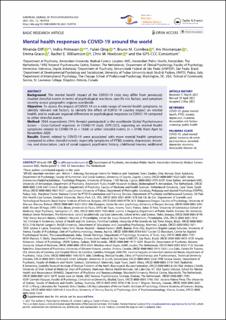Mental health responses to COVID-19 around the world
Olff, Miranda; Primasari, Indira; Qing, Yulan; Coimbra, Bruno M.; Hovnanyan, Ani; Grace, Emma; Williamson, Rachel E.; Hoeboer, Chris M.; Aakvaag, Helene Flood; Ajdukovic, Dean; Anastassiou-Hadjicharalambous, Xenia; Bakker, Anne; Bröcker, Erine E.; Cantoni, Lucia; Cloitre, Marylène; de Soir, Erik LJL; Dragan, Małgorzata; Dyregrov, Atle; El-Hage, Wissam; Ford, Julian D.; Haagsma, Juanita A.; Javakhishvili, Jana D.; Kassam-Adams, Nancy; Kristensen, Christian H.; Langevin, Rachel; Lanza, Juliana A.; Lueger-Schuster, Brigitte; Manickam, Leister S. S.; Marengo, Davide; Mello, Marcelo F.; Nickerson, Angela; Oe, Misari; Ozgen, Mihriban Heval; Rabellino, Daniela; Sales, Luisa; Salgado, Carolina; Schellong, Julia; Schnyder, Ulrich; Seedat, Soraya; Semenova, Nadezhda B.; Smith, Andrew J.; Sobczak, Sjacko; ter Heide, Jackie June; Vazquez, Carmelo; Videira Pinto, Janaina; Wagner, Anne C.; Wang, Li; Zrnic, Irina
Journal article, Peer reviewed
Published version

Åpne
Permanent lenke
https://hdl.handle.net/11250/2834414Utgivelsesdato
2021Metadata
Vis full innførselSamlinger
Originalversjon
European Journal of Psychotraumatology. 2021, 12 (1), 1929754. 10.1080/20008198.2021.1929754Sammendrag
Background: The mental health impact of the COVID-19 crisis may differ from previously studied stressful events in terms of psychological reactions, specific risk factors, and symptom severity across geographic regions worldwide.Objective: To assess the impact of COVID-19 on a wide range of mental health symptoms, to identify relevant risk factors, to identify the effect of COVID-19 country impact on mental health, and to evaluate regional differences in psychological responses to COVID-19 compared to other stressful events.Method: 7034 respondents (74% female) participated in the worldwide Global Psychotrauma Screen – Cross-Cultural responses to COVID-19 study (GPS-CCC), reporting on mental health symptoms related to COVID-19 (n = 1838) or other stressful events (n = 5196) from April to November 2020.Results: Events related to COVID-19 were associated with more mental health symptoms compared to other stressful events, especially symptoms of PTSD, anxiety, depression, insomnia, and dissociation. Lack of social support, psychiatric history, childhood trauma, additional stressful events in the past month, and low resilience predicted more mental health problems for COVID-19 and other stressful events. Higher COVID-19 country impact was associated with increased mental health impact of both COVID-19 and other stressful events. Analysis of differences across geographic regions revealed that in Latin America more mental health symptoms were reported for COVID-19 related events versus other stressful events, while the opposite pattern was seen in North America.Conclusions: The mental health impact of COVID-19-related stressors covers a wide range of symptoms and is more severe than that of other stressful events. This difference was especially apparent in Latin America. The findings underscore the need for global screening for a wide range of mental health problems as part of a public health approach, allowing for targeted prevention and intervention programs.
